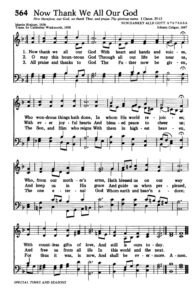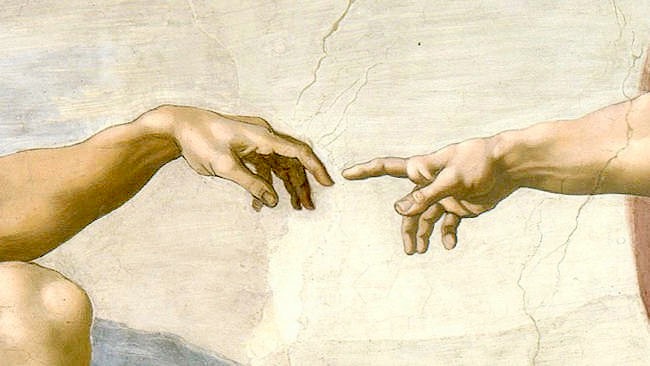Now thank we all our God with heart and hands and voices,
who wondrous things hath done,
In whom this world rejoices;
who from our mothers’ arms,
hath blessed us on our way with countless gifts of love,
and still is ours today.
.
By BENJAMIN PRATT
Author of A Guide for Caregivers
Those words of this well-known hymn are particularly meaningful in our world right now, when the coronavirus has become a pandemic. Ironically, they were penned in 1636-1637, during an outbreak of yet another terrible plague.
 Knowing more about the history of this hymn can point us to spiritual resources for coping with the uncertainties of the coronavirus. The text of the iconic hymn of thanksgiving and praise was written during a relentless war and severe plague by Martin Rinkart, a German Lutheran clergyman and author of hymns.
Knowing more about the history of this hymn can point us to spiritual resources for coping with the uncertainties of the coronavirus. The text of the iconic hymn of thanksgiving and praise was written during a relentless war and severe plague by Martin Rinkart, a German Lutheran clergyman and author of hymns.
Rinkart became head of the archdiocese of Eilenburg, where he was born in 1586 and died in 1649. He served there during the Thirty Years’ War and a severe plague. Eilenberg was a walled town and refuge for fugitives from far and near. It suffered from famine and disease in the midst of unsanitary and over-crowded conditions. As if the war was not enough, the extraordinary severity of the plague took the lives of all but three of the town council, numerous children and the clergymen of a neighboring parish.
During the great pestilence, officials and clergy either died or ran away, leaving Rinkart alone to care for the living and the dead. He read the burial service for 40-50 persons a day—in all about 4,480. Eventually the burials were moved to trenches, without service.
The total of 8,000 persons who died included Rinkart’s wife. This was followed by one sacking by the Austrians and two by the Swedes who levied crippling fines on the town. It was Rinkart’s prayers and negotiations that reduced the levys. His body and finances were worn out—and he died at the age of 63.
O may this bounteous God through all our life be near us,
with ever joyful hearts and blessed peace to cheer us;
and keep us in God’s grace, and guide us when perplexed
and free us from all ills in this world and the next.

Click on this copy of the hymn to see it in a larger size. This image comes courtesy of the Hymnary.org website.
The original text was entitled, “Tisch-Gebetlein,” or a “short Grace before meals.” This is amazing, considering the famine that accompanied the War and the insufferable plague. It is our human yearning and remembrance of God’s bounty, love, guidance, and appeal for peace, for freedom from suffering, for assurance of salvation, that people most needed.
In a time in which it appears that God has gone silent and abandoned us, this hymn heralds the deepest sense of faith—an everlasting presence of God in whom we trust.
The final verse is Rinkart’s paraphrase of the Gloria Patri.
All praise and thanks to God, who reigns in highest heaven,
with ever joyful hearts and blessed peace to cheer us;
the one eternal God, whom heaven and earth adore,
the God who was, and is, and shall be evermore.
May we, in this time of a pandemic, yearn for the faith, trust, gratitude, courage and love which undergirded the life and work of Martin Rinkart.
May we remember those afflicted with the virus who cannot be held and embraced by their loved ones as they die.
May we remember those who must risk their own health to care for the afflicted—those who must choose between preserving their own health and going to work to put food on the family table.
May we remember those who will lose work and have no monetary cushion.
When we cannot embrace our loved ones, let us seek new ways to be the a loving embrace of God to our neighbors.
Amen
Written March 13, 2020, by my hand, while living in the petri dish of a Continuing Care Community for Seniors.
Judith and I are feeling grateful and well.
Of course, we all welcome your payers.
.


We all need to stop and listen to the words of the faithful and pray for God’s redeeming graces. We need to trust he will show us the way.
Thank you Ben for this beautiful sermon.